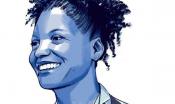text
Literature
Wade in the Water

In this poem, Smith recounts her experience at a Geechee Gullah Ring Shouters’ show and the love she, and every other audience member, was shown.
February 21, 2019

